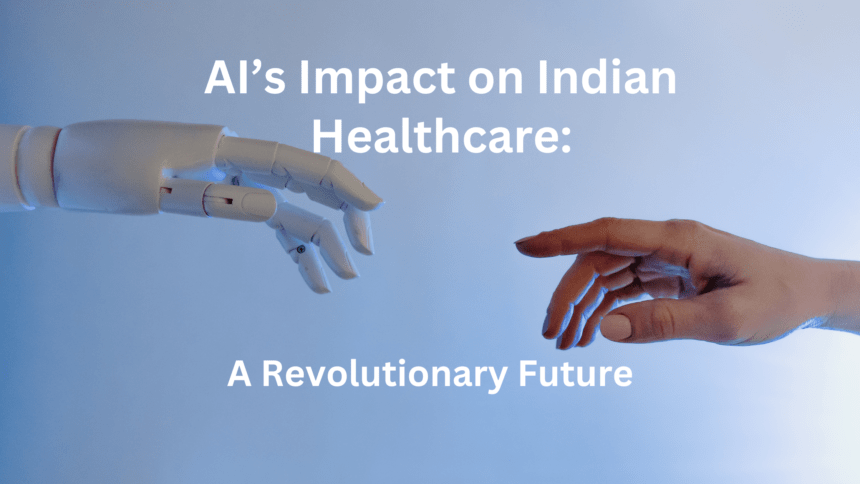The Transformative Power of Artificial Intelligence in Indian Healthcare
Artificial Intelligence (AI) is rapidly transforming various sectors across the globe, and healthcare in India is no exception. With its potential to revolutionize diagnostics, treatment, and overall patient care, Artificial Intelligence is poised to bring about significant changes in the Indian healthcare landscape.
Understanding AI in Healthcare

Definition of Artificial Intelligence
Artificial Intelligence, or AI, involves the simulation of human intelligence processes by machines, particularly computer systems. These processes include learning, reasoning, and self-correction.
Artificial Intelligence’s Role in Modern Medicine
It plays a crucial role in modern medicine by enhancing the capabilities of healthcare providers. From diagnosing diseases to predicting patient outcomes, AI’s applications in healthcare are vast and varied.
Artificial Intelligence in Diagnostics
Artificial Intelligence-Powered Diagnostic Tools
Artificial Intelligence-powered diagnostic tools are transforming the way diseases are detected. These tools analyze medical images, lab results, and patient histories with remarkable accuracy, often identifying conditions that human practitioners might miss.
Improving Diagnostic Accuracy
The precision of Artificial intelligence in diagnostics is unparalleled. By leveraging vast datasets, AI systems can recognize patterns and anomalies that are indicative of specific diseases, leading to earlier and more accurate diagnoses.
Artificial Intelligence in Treatment Planning
Personalized Treatment Plans
It helps in creating personalized treatment plans tailored to individual patients. By analyzing genetic information, lifestyle factors, and medical history, AI can recommend treatments that are more effective and have fewer side effects.
Predictive Analytics in Treatment
Predictive analytics uses AI to forecast patient responses to various treatments. This allows healthcare providers to tailor treatment plans proactively, improving the chances of successful outcomes and minimizing complications.
Artificial Intelligence in Surgery
Robotic Surgery Systems
Robotic surgery systems, powered by Artificial Intelligence, offer unprecedented precision and control. These systems assist surgeons in performing complex procedures with minimal invasiveness, reducing recovery times and improving surgical outcomes.
Minimally Invasive Techniques
AI-driven robotics and imaging technologies facilitate minimally invasive surgeries. These techniques result in less trauma to the body, quicker recoveries, and lower risks of infection, making surgery safer and more efficient.
Artificial Intelligence in Patient Monitoring
Real-Time Health Monitoring
Artificial Intelligence enables real-time health monitoring through wearable devices and remote sensors. These tools collect continuous data on vital signs, activity levels, and other health metrics, providing healthcare providers with a comprehensive view of a patient’s health.
Managing Chronic Diseases with AI
For chronic conditions like diabetes and hypertension, AI offers continuous monitoring and management solutions. Artificial Intelligence systems can alert patients and doctors to potential issues before they become serious, enabling timely interventions.
Artificial Intelligence in Medical Imaging
Enhanced Imaging Solutions
Artificial Intelligence enhances medical imaging by improving the clarity and detail of images. Advanced imaging solutions powered by AI provide deeper insights into the human body, aiding in the accurate diagnosis and treatment of various conditions.
Artificial Intelligence in Radiology
It’s impact on radiology is profound.Artificial Intelligence algorithms analyze radiographic images swiftly and accurately, assisting radiologists in detecting abnormalities and making precise diagnoses. This improves diagnostic accuracy and speeds up the treatment process.
Artificial Intelligence in Drug Discovery
Accelerating Drug Development
Artificial Intelligence accelerates the drug discovery process by identifying potential drug candidates more quickly than traditional methods. By analyzing biological data,Artificial Intelligence can predict how new drugs will interact with the body, speeding up the development of effective treatments.
Artificial Intelligence in Clinical Trials
In clinical trials, Artificial Intelligence helps in selecting suitable participants, monitoring their progress, and analyzing results in real-time. This ensures trials are more efficient, accurate, and cost-effective, leading to faster approval of new drugs.
Artificial Intelligence in Healthcare Administration
Automating Administrative Tasks
AI streamlines administrative tasks by automating processes like scheduling, billing, and record-keeping. This reduces the administrative burden on healthcare providers, allowing them to focus more on patient care and less on paperwork.
Cost Reduction through Artificial Intelligence
By optimizing workflows and improving efficiency, It helps healthcare organizations reduce operational costs. This results in more affordable healthcare services and better resource allocation, ultimately benefiting patients.
Artificial Intelligence in Rural Healthcare
Bridging the Urban-Rural Gap
Artificial Intelligence has the potential to bridge the gap between urban and rural healthcare. Artificial Intelligence-powered telemedicine platforms provide remote consultations, diagnostic services, and continuous care to patients in underserved areas, improving access to quality healthcare.
Telemedicine and Remote Consultations
Telemedicine, supported by Artificial Intelligence, enables doctors to diagnose and treat patients remotely. This is particularly beneficial in rural India, where access to healthcare facilities is limited. AI ensures that patients receive timely and accurate medical advice, regardless of their location.
Artificial Intelligence and Mental Health
In Mental Health Assessments
Artificial Intelligence is transforming mental health care by providing tools for psychological assessments. These tools analyze speech patterns, facial expressions, and other indicators to assess a patient’s mental state, enabling early diagnosis and intervention.
Virtual Therapy and Support
Virtual therapists and Artificial Intelligence-driven support systems offer accessible mental health care. These platforms provide therapy sessions, crisis intervention, and ongoing support, making mental health services more available and reducing the stigma associated with seeking help.
Artificial Intelligence in Public Health
Predicting Disease Outbreaks
AI aids in tracking and predicting disease outbreaks by analyzing data from various sources. This helps public health officials take preventive measures and manage public health crises more effectively, potentially saving countless lives.
In Health Education
Artificial Intelligence-driven platforms play a crucial role in health education and awareness campaigns. They provide personalized health information, educate the public about preventive measures, and promote healthy lifestyles through interactive and engaging content.
Ethical Considerations
Privacy and Data Security
The use of Artificial Intelligence in healthcare raises important ethical considerations, particularly around patient privacy and data security. Ensuring that patient data is protected and used responsibly is essential to maintaining trust in AI technologies.
Ethical Artificial Intelligence Decision-Making
Artificial Intelligence decision-making in healthcare must be transparent and accountable. Clear guidelines and regulations are needed to ensure that AI systems make ethical decisions and that there is accountability when things go wrong.
Regulatory Challenges
Navigating Healthcare Regulations
Regulating Artificial Intelligence in healthcare is complex. It requires balancing innovation with patient safety. Policymakers must develop comprehensive regulations that address the unique challenges posed by AI technologies while fostering their growth.
Ensuring Compliance
Artificial Intelligence technologies must comply with national and international standards to ensure safety, efficacy, and interoperability. This involves rigorous testing, certification, and continuous monitoring to maintain high standards of care.
Success Stories in India
Artificial Intelligence in Leading Indian Hospitals
Several Indian hospitals have successfully integrated Artificial Intelligence into their operations. These case studies highlight the positive impact of Artificial Intelligence on patient care, from improved diagnostics to enhanced treatment outcomes.
Noteworthy Initiatives
India has launched numerous Artificial Intelligence healthcare initiatives aimed at improving public health. These initiatives demonstrate the potential of AI to transform the healthcare landscape and address pressing health challenges.
Future Trends
Emerging Artificial Intelligence Technologies
The future of Artificial Intelligence in healthcare is bright, with emerging technologies set to further revolutionize the industry. Innovations such as Artificial Intelligence-powered genomics, nanotechnology, and advanced robotics hold promise for even more groundbreaking advancements.
Predictions for AI in Healthcare
Experts predict that Artificial Intelligence will continue to evolve, becoming more integrated into everyday healthcare practices. Future trends include more personalized medicine, smarter healthcare systems, and broader access to high-quality care.
Challenges and Limitations
Technological Barriers
Despite its potential, Artificial Intelligence in healthcare faces technological and infrastructural barriers. These include inadequate data infrastructure, limited access to advanced technologies, and a lack of skilled professionals to implement and maintain Artificial Intelligence systems.
Societal Resistance
There is also societal and cultural resistance to Artificial Intelligence in healthcare. Many people are skeptical about the reliability of Artificial Intelligence and are concerned about the potential loss of human touch in medical care. Overcoming these challenges requires education and awareness campaigns.
Impact on Healthcare Workforce
As a Collaborative Tool
Artificial Intelligence is not a replacement for healthcare professionals but a collaborative tool. It assists doctors and nurses in making better decisions, improving efficiency, and providing high-quality care to patients.
Changing Job Roles
While Artificial Intelligence will transform job roles within healthcare, it will also create new opportunities. Professionals will
need to adapt to changing roles and acquire new skills to work effectively alongside AI technologies.
Government and Policy Support
Government Initiatives
The Indian government is actively promoting the use of Artificial Intelligence in healthcare through various initiatives. These programs aim to foster innovation, support research and development, and ensure that AI technologies benefit all segments of society.
Policy Frameworks
A robust policy framework is essential to support the growth of Artificial Intelligence in healthcare. This includes funding for Artificial Intelligence research, developing standards and guidelines, and ensuring that ethical considerations are addressed.
Conclusion
The Future Path for Artificial Intelligence in Indian Healthcare
Artificial Intelligence is set to revolutionize Indian healthcare, offering solutions to some of the most pressing challenges in the industry. As Artificial Intelligence technologies continue to evolve, they hold the promise of a brighter, healthier future for India. Embracing this revolution requires collaboration between technology developers, healthcare providers, policymakers, and the public to ensure that the benefits of Artificial Intelligence are realized for all.













